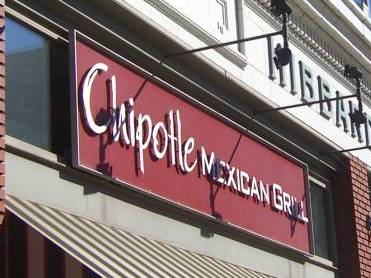
As the debate on whether to label food products that contain genetically modified organisms heats up, some food companies have taken it upon themselves to identify products that contain GMOs.
The high-end natural foods grocer Whole Foods Market recently said it would label all products with GMOs in its stores by 2018. The announcement follows similar moves by other health retailers like Trader Joe’s, which has eliminated the usage of GMOs in its store brand, and Natural Grocers, which includes on all of its labels whether a product might contain GMOs.
But now Chipotle, the self-described fresh and healthy fast-food chain, has taken the debate on GMOs a step further by becoming the first major U.S. food supplier to disclose its GMO ingredients.
On its website, Chipotle lists the ingredients and seasonings in everything from its meats and salsas to rice, beans and tortillas. Next to each item, the company lists whether the product is locally sourced, organic, or contains hydrogenated oils, preservatives and GMOs.
As it turns out, GMOs are in just about every item at the restaurant, but the company says that’s largely because of its heavy use of soybean oil. While the GMO-filled burrito may stop some from dining at the restaurant, the company insists that informing the public is just the first part of the fast-food chain’s plan to end the use of GMO products.
“Our goal is to eliminate GMOs from Chipotle’s ingredients, and we’re working hard to meet this challenge,” the company writes on its website. “For example, we recently switched our fryers from soybean oil to sunflower oil. Soybean oil is almost always made from genetically modified soybeans, while there is no commercially available GMO sunflower oil. Where our food contains currently unavoidable GM ingredients, it is only in the form of corn or soy.”
GMOs: The most common ingredient in the U.S.?
More than 60 countries around the world ban the use of GMOs, but in the U.S., GMO-free restaurants are usually one-of-a-kind, locally owned eateries.
Since the late ‘90s, the Organic Consumers Association, Friends of the Earth, Greenpeace, the Center for Food Safety, and others have been pressuring 15 of America’s largest food corporations to not only label products that are genetically modified, but to stop using GMO ingredients entirely.
McDonald’s was one of the fast-food chains the group targeted, and the push was semi-successful. The chain stopped using genetically engineered potatoes from Monsanto, but unlike Chipotle, McDonald’s decision was kept fairly quiet.
Now some opponents of GMO ingredients fear McDonald’s may backtrack.
Since 1967, the company has gotten at least half of its potato supply from U.S. potato supplier J.R. Simplot Co., according to a report from Truthstream Media. Simplot is now seeking approval of its own GMO potatoes.
Because McDonald’s was largely concerned with companies like Monsanto combining the genes of potatoes with other organisms, Simplot reasoned that it would most likely be able to get McDonald’s to approve of its modified potatoes since its new potatoes were combined only with other types of potatoes.
Truthstream Media suggests that McDonald’s will begin using the genetically engineered potatoes, which were designed to not bruise or have black spots, since the company’s former president Janice L. Fields is on the Board of Directors for Monsanto. Fields sat on the Monsanto board for 2 years while she also served as president of McDonald’s.
McDonald’s sells about 9 million pounds of french fries everyday around the world. The potato itself has become a large part of the American diet, as Americans spend $10 billion on potato chips every year.
Altering DNA
The effect of GMOs on human health is not entirely known, since GMOs have only been used for about 20 years. GMO products may also be harmful to the overall ecosystem, since a lack of genetic diversity reduces the likelihood a plant will be able to survive droughts, fungus invasions or insects.
As more information about GMOs’ health impact becomes apparent, many states have tried to pass legislation that would require all GMO products to be labeled.
As Mint Press News previously reported, Connecticut was the first state to pass such legislation, but the historic law came with a catch: At least four other states, including one that borders Connecticut, must pass similar GMO-labeling legislation before it can go into effect.
Last week, Maine became the second state to pass a GMO-labeling law, and 26 other states have legislation pending. Since 90 percent of Americans believe genetically modified foods should be labeled as such, legislation in all 26 states could pass if left to the voters.
However, efforts to pass such legislation are opposed by big agriculture businesses such as Monsanto, BASF, Bayer, Dow, DuPont and Syngenta — the “Big Six” companies that control the world’s seed, pesticide and biotechnology industry.
Last year, those six companies spent $46 million in the state of California alone trying to persuade voters to vote against a piece of legislation that would have required GMO products to be labeled as such.
Cathleen Enright, the executive vice president of the food and agriculture section for the Council of Biotechnology Information, which made contributions to opponents of California’s pro-labeling Proposition 37, said that laws like the one that passed in Connecticut are “misleading” and will “lead to increased consumer confusion.”
“[Mandatory labeling] suggests there is a difference in safety or nutrition between biotech food and organic food, when there is none,” she said.


